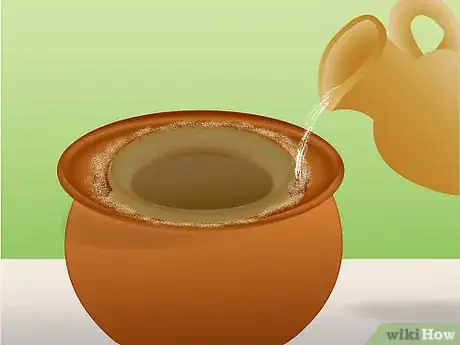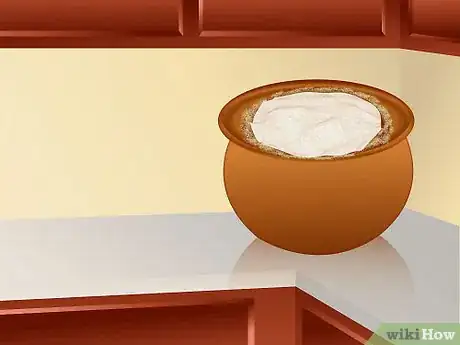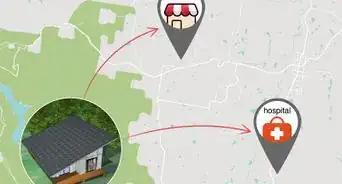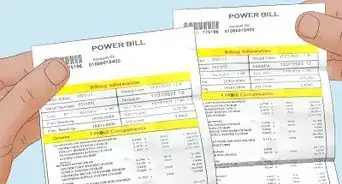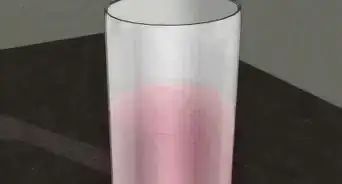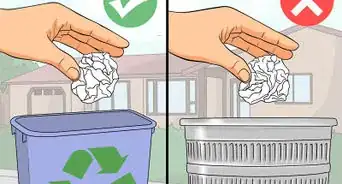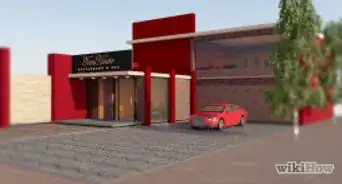wikiHow is a “wiki,” similar to Wikipedia, which means that many of our articles are co-written by multiple authors. To create this article, 28 people, some anonymous, worked to edit and improve it over time.
wikiHow marks an article as reader-approved once it receives enough positive feedback. This article received 12 testimonials and 94% of readers who voted found it helpful, earning it our reader-approved status.
This article has been viewed 402,550 times.
Learn more...
In a community or situation without electricity, storage of food long-term can be tricky. One simple solution is to build your own pot-in-pot fridge, using basic pots, sand and water. An idea revived by Mohammed Bah Abba, this refrigerator is now being used by many farmers in warm climates who need to preserve their food for a longer time and keep the insects away.
Keeping the sand moist all the time enables evaporation to cool the produce kept inside the inner pot. This enables the storage of freshly grown vegetables to last much longer than usual in a hot climate. It is also great for using at a picnic or outdoor meal where there is no electricity outside but food or drinks need to be kept cool. Here is how to make your own.
Steps
-
1Obtain two large clay or terracotta pots. One pot must be smaller than the other pot. Check that the smaller pot fits inside the larger and that there is a space around it of at least one centimetre, up to three centimetres.
-
2Fill in any holes at the base of the pots. Use clay, large pebbles, cork, a homemade paste - anything suitable to hand to fill the hole. If you leave the holes open, the water will enter the inner pot and will also run out of the larger pot, making the fridge ineffective.[1]
- Putty or duct tape can plug the hole.
Advertisement -
3Fill the base of the larger pot with coarse sand. Fill about 2.5cm/1 inch deep, and only fill to a height that will ensure the smaller pot sits even in height with the larger pot.[2]
-
4Place the small clay pot into the large pot. Arrange its base flat on top of the lower layer of sand.
-
5Fill all around the small pot with sand. Fill it almost all the way, except for leaving a small gap at the top.
-
6Pour cold water over the sand. Do this until the sand is completely soaked and unable to take any more water. As you pour, do so gradually in order to give the water time to soak into the terracotta.[3]
-
7Take a cloth, tea towel or towel and dip it into water. Place it over the top of the inner pot so that it covers it completely.[4]
- Wet hessian or similar fabric also works well.
-
8Allow the inner pot to cool down. If you have a thermometer, you can use this, otherwise test the temperature with your hands.
-
9Keep the pot-in-pot refrigerator in a dry, ventilated space for the water to evaporate effectively towards the outside.[5]
-
10Place vegetables or other items inside for storage.[6] You will need to keep checking regularly for the dampness of the sand. Pour in more water as it becomes drier to keep it well moistened. Usually this will need to be done twice a day.
- You can add food or drinks to the pot-in-pot refrigerator if you're having an outdoor party or picnic. Make one for the drinks and one for the food if you have a lot of items.
Community Q&A
-
QuestionDo I have to use clay pots or will PVC/metal cylinders work?
 Community AnswerYou cannot use PVC or metal containers because they don't allow evaporation like clay pots do, which is the whole point of the device. Clay pots allow evaporative cooling to take place because they are permeable to air.
Community AnswerYou cannot use PVC or metal containers because they don't allow evaporation like clay pots do, which is the whole point of the device. Clay pots allow evaporative cooling to take place because they are permeable to air. -
QuestionDoes this pot system use a lid, or just the cloth?
 Community AnswerIt can have an earthenware lid or a wet cloth, but both togther would be better to use.
Community AnswerIt can have an earthenware lid or a wet cloth, but both togther would be better to use. -
QuestionAs an artist, I can throw pots on a wheel; do they have to be that shape, or as long as they fit together and have a lip will it work?
 Community AnswerShape of the pots does not matter. But inner pot with small mouth covered with clay lid works tremendously well.
Community AnswerShape of the pots does not matter. But inner pot with small mouth covered with clay lid works tremendously well.
Warnings
- Do not use glazed earthenware; only unglazed.⧼thumbs_response⧽
- Evaporative cooling works most effectively in dry heat and this pot-in-pot refrigerator is no different. In high humidity, you will find that this solution does not work.⧼thumbs_response⧽
Things You'll Need
- Two clay (terracotta) pots, unglazed, one larger than the other
- Sand
- Water
- Cloth to cover the pots
- Clay, cork or other material to plug holes in the pots if they have them
References
- ↑ https://www.youtube.com/watch?v=Nctr9xJIxUs
- ↑ https://movement-verein.org/wp-content/uploads/2015/07/informationen_projekte_clay_pot_cooler_2014_en.pdf
- ↑ https://www.youtube.com/watch?v=1DvEMyjesLU
- ↑ https://www.survivalsullivan.com/how-to-make-a-zeer-pot/
- ↑ Wikipedia, Pot-in-Pot Refrigerator, http://en.wikipedia.org/wiki/Pot-in-pot_refrigerator
- ↑ http://content.time.com/time/specials/packages/article/0,28804,1936165_1936254_1936632,00.html





